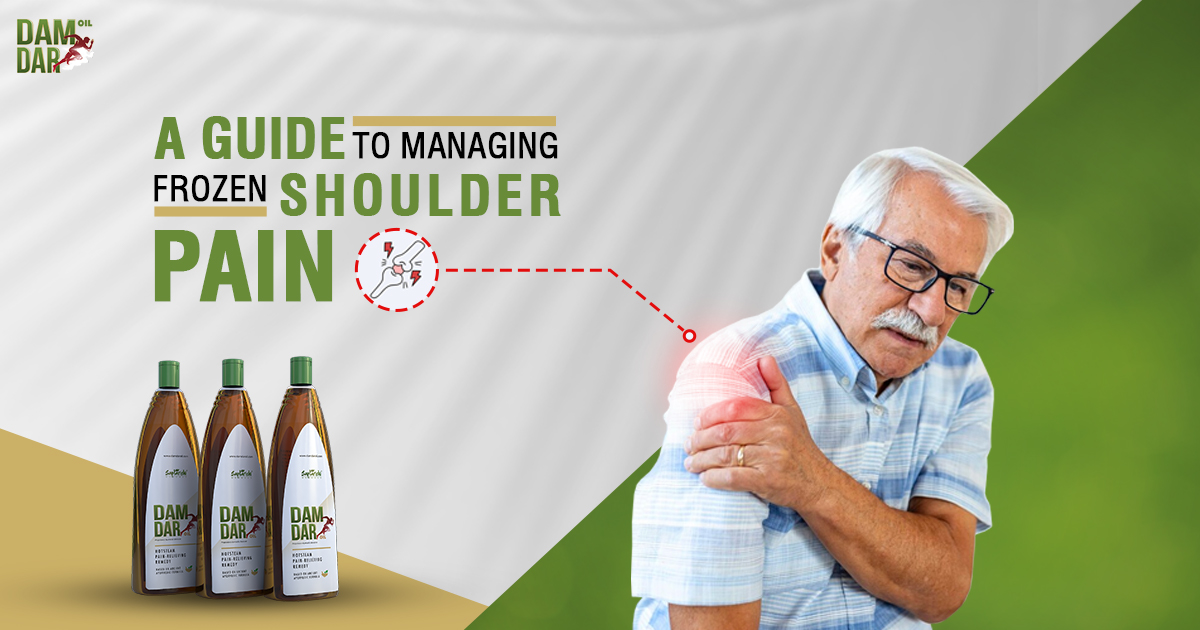A Guide to Managing Frozen Shoulder Pain

Shoulder pain can be a realbother, especially if it's due to a condition like a frozen shoulder. It can make everyday tasks like lifting your arm or reaching for something feel like a massive challenge. Understanding the reasons and causes behind shoulder pain is crucial in managing it. In this guide, we'll examine the complexities of frozen shoulder pain and provide detailed insights into its relief and treatment options.
Understanding Shoulder Pain: Reasons and Causes
Shoulder pain can stem from various sources, ranging from injuries, underlying medical conditions, or overdoing it during a workout. Sometimes, shoulder pain can be caused by conditions like arthritis or tendonitis. Common causes include:
Frozen Shoulder Pain: Also known as adhesive capsulitis, frozen shoulder is characterized by stiffness and pain in the shoulder joint, limiting its range of motion. This can happen if you overuse your shoulder muscles or if they become inflamed.
Shoulder Joint Pain: Discomfort starting from the shoulder joint itself can result from injuries, arthritis, or inflammation.
Shoulder Muscle Pain: Overuse, strain, or injury to the muscles surrounding the shoulder joint can lead to muscle pain. Sometimes, the pain might not just be in your shoulder. It could also travel down your arm or even into your neck and back. This can make it feel like the pain is everywhere!
Rotator Cuff Shoulder Pain: The rotator cuff includes tendons and muscles critical for shoulder movement. Injury or inflammation of these structures can cause significant pain.
Shoulder Bone Pain: Breaking a bone, popping a joint out of place, or dealing with arthritis can all make your shoulder bones hurt.
Shoulder Nerve Pain: When your nerves get squeezed or hurt you might feel pain shooting down your arm with numbness, or tingling sensations in the shoulder area.
Other Causes: Shoulder pain can be caused by all sorts of things, like injuries from accidents, pushing yourself too hard, slouching too much, or even conditions like tendonitis or bursitis.
It's like your shoulder is saying, "Hey, I've had enough!" So, if you're feeling this kind of pain, it's essential to figure out what's causing it and take steps to fix it.
Identifying Frozen Shoulder Pain Areas
Frozen shoulder pain typically manifests in specific areas, including:
- Front Shoulder Pain
- Back Shoulder Pain
- Pain Between Shoulder Blades
- Pain Under Shoulder Blade
- Shoulder Blade Pain
- Shoulder Tip Pain
Understanding these pain areas can help in diagnosing and managing frozen shoulders effectively.
Relief and Treatment Options
-
Medication:
Over-the-counter pain relievers like ibuprofen or acetaminophen can alleviate mild to moderate shoulder pain. For severe pain, prescription medications or muscle relaxants may be necessary.
-
Physical Therapy:
Going through a physical therapy program can really do wonders for your shoulder. It's like having a roadmap to help you get back on track. With exercises, stretches, and hands-on techniques from a physical therapist, you can improve how well your shoulder moves and how strong it feels. So, if you're dealing with frozen shoulder pain, give physical therapy a shot—it could make all the difference!
-
Heat and Cold Therapy:
One of the easiest ways to relieve shoulder pain is to use ice or heat packs. Just apply them to your shoulder for about 15-20 minutes at a time to help reduce inflammation and ease the pain. It's like giving your shoulder a little spa treatment!
Alternating between heat and cold packs can provide temporary relief from frozen shoulder pain. Heat therapy aids in muscle relaxation, whereas cold therapy diminishes inflammation and numbs the affected region.
-
Shoulder Pain Relief Exercises:
Specific exercises targeting shoulder mobility and strength are beneficial for individuals with frozen shoulders. Simple movements like shoulder rolls or arm circles can work wonders. Just be sure not to overdo it – you don't want to make the pain worse!
These exercises should be performed regularly and gradually progressed under professional supervision.
-
Ayurvedic Therapy:
Utilizing natural remedies, such as herbal oils, massages, and specific dietary recommendations, Ayurveda aims to balance the body's energies and promote healing from within. Treatments may include warm oil massages, herbal poultices, and dietary modifications tailored to individual doshas (body types).
-
Homeopathic Medicines:
Homeopathic remedies derived from natural sources are prescribed to stimulate the body's healing mechanisms and restore balance. Homeopathic treatment aims to address the underlying causes of frozen shoulder, such as inflammation, stiffness, and pain, while also considering the person's overall health and well-being.
Quick Relief Measures and Home Remedies
Rest: Avoid activities that aggravate shoulder pain and allow adequate rest for the affected shoulder.
Posture Correction: Maintain proper posture to prevent undue strain on the shoulder joint and muscles.
Gentle Stretching: Perform gentle shoulder stretches to improve flexibility and reduce stiffness.
Ergonomic Modifications: Make ergonomic adjustments to workstations and daily activities to minimize shoulder strain.
Topical Pain Relief: Utilize topical analgesic creams or patches for localized pain relief.
Lifestyle Modifications: Maintain a healthy lifestyle with regular exercise, balanced nutrition, and stress management techniques to support overall musculoskeletal health.
Conclusion
Frozen shoulder pain can drastically impact daily life and functionality. By understanding the underlying causes and implementing appropriate relief and treatment strategies, individuals can effectively manage and alleviate shoulder pain. The most important thing is not to ignore your shoulder pain. It's your body's way of telling you that something isn't right, and the sooner you address it, the sooner you can start feeling better.
So, whether you're dealing with a frozen shoulder, muscle pain, or something else entirely, remember that there are ways to manage your shoulder pain and get back to doing the things you love. Don't let shoulder pain hold you back – banish it for good with these simple tips and tricks!
